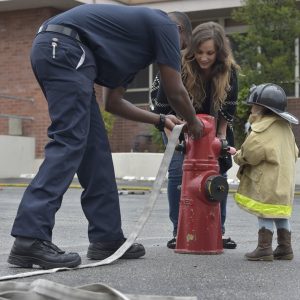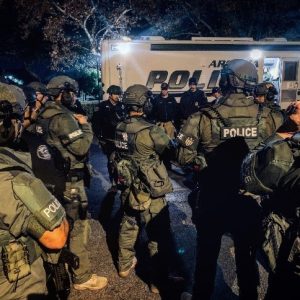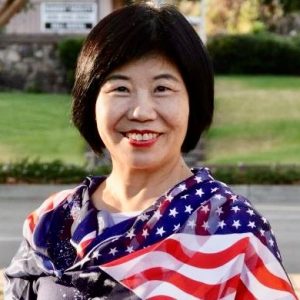 View Winners →
View Winners → Arcadia High School Senior Makes Intel Science Talent Search Finals

Arcadia High student George Hou with his science project. – Courtesy Photo
By May S. Ruiz
George Hou, a 17-year-old Arcadia High School senior, has a lot of things on his mind right now. This is the time when 12th graders are waiting to hear back from the schools to which they applied. But college decisions are not what he is currently preoccupied with – he is busy continuing the research project that earned him a spot in the 75th Annual Intel Science Talent Search (STS).
George’s research titled, “Separating Mixed Signals in Noise-Polluted Environments Using Global Optimization” was prompted by his desire to find a better hearing aid for his grandfather. He says, “I was very close to my grandpa growing up and enjoyed talking to him. He’s in his 80s and has always been hard of hearing so we had to raise our voices. But in December 2013 he completely lost his hearing and started to wear a hearing aid. Then he stopped using it because it only amplified the background noise. All of a sudden we couldn’t talk to him and that came as a shock to me.”
To help his grandpa, George investigated various hearing aids on the market to see if more expensive brands were better at filtering out background noise. But none of them could. Through his internet search, he came across a book called “The Mathematical Modelling and Signal Processing in Speech and Hearing Sciences” by UC Irvine professor, Dr. Jack Xin. He found it very interesting but realized his 10th grade math was not enough to make him understand much of it.
“I took a leap of faith and emailed the author and, to my surprise, he responded after a few weeks and even offered to mentor me,” George relates. “We developed a good relationship and he sent me various materials to read. That led us to pursue this further – using applied math we were able to use mathematical theory and analysis to develop an algorithm that can successfully separate sounds. We were able to prove that this can be done under specific circumstances. So all background noise can be separated individually – like birds chirping or people talking.”
For the next one and a half years, George worked on his research with Dr. Xin’s guidance. During the school year, he spent anywhere from seven to 10 hours per week on it. In the summer months, he devoted nine hours a day and twice a week drove to UC Irvine, to confer and to show his progress to Dr. Xin.
While George worked on this project on his own, outside of school, his teachers encouraged him to enter the Intel Science competition. He confesses that the application process for the competition was, “insanely long – like working on five college applications. I almost didn’t want to do it but my teachers spurred me on – they really were the driving force behind me. They all said I had nothing to lose.”
And that prognostication proved omniscient. On Jan. 6, Arcadia High School’s principal received a letter from Intel Science Talent Search informing him that George has been selected one of 300 semifinalists. Arcadia High is one of 191 schools across the country from which one or more Intel STS semifinalists were named this year.
On Jan. 20, George was named one of 40 students to make it to the final round who will attend the Intel Science Talent Institute in Washington, D.C., from March 10 to 16 to compete for top awards. Three $150,000 awards will be handed out; each Intel STS semifinalist and the school he or she attends will receive $1,000.
George is monumentally thrilled to be coming face-to-face with the judges. “I am mentally preparing myself to stay composed when I meet all these Nobel Laureates. I don’t want to embarrass myself by totally geeking out on them when they ask me about my work,” he confides.
I am also very eager to use this as a platform to share my research with other people and spread awareness. There are 360 million people worldwide with disabling hearing problems; maybe my idea will allow other researchers, inventors, and scientists to build off it. With our combined effort we could tackle the problem and create something to help older people hear better,” George concludes.
Shortly after George returns from Washington, D.C., he will find out if he has been accepted to the schools he applied to. He wants to attend a large research university to pursue Applied Math and Signal Processing, and where he can continue to work on his project. He would like to come up with a robust algorithm and method to implement with current hearing aids. In the future he would like to be able to design a new generation of hearing aids.
At the very least, hearing problems could be a source of much annoyance for millions of senior citizens. If George is successful in his endeavor, there could one day be a hearing aid that older people would actually want to wear. And that would significantly improve the lives of seniors during their waning years.












































































































